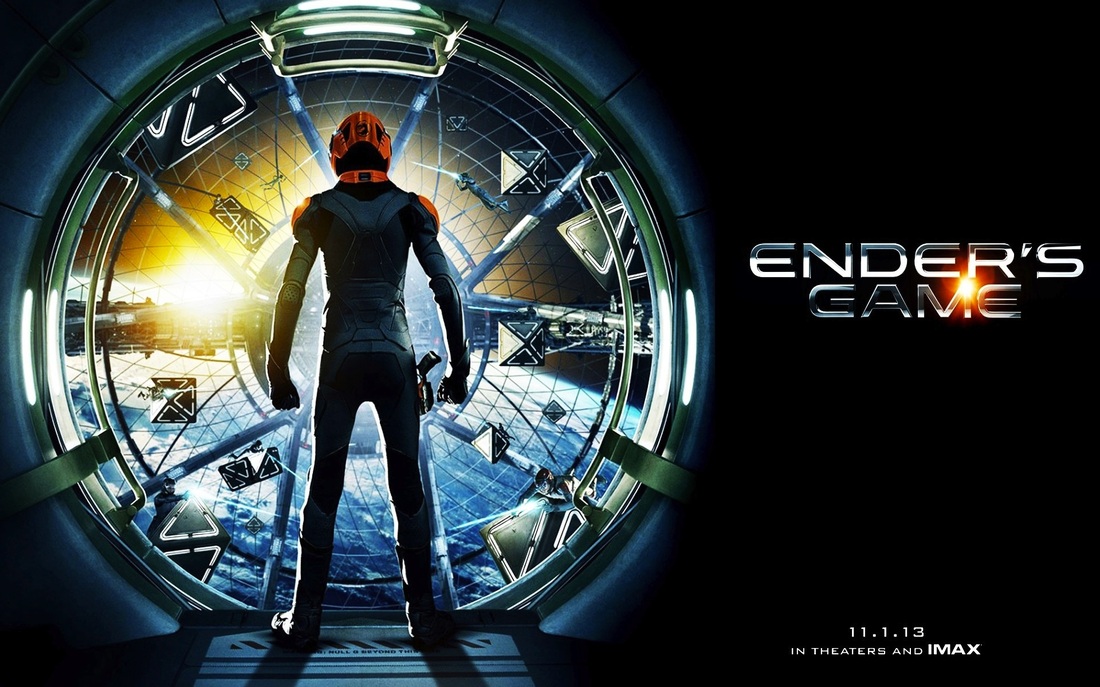As such, allow me to start by commending Ender's Game--an always assertive, sometimes impatient film based on Orson Scott Card's 1985 novel—for three things it does well. First, Asa Butterfield (previously, Hugo) nails his starring role as Ender, mixing family loyalty, hard-earned self-awareness, and a guarded commitment to civic duty. It's a performance five years more mature than it should be, and no actor is so thoroughly committed to his role, even during the film's silliest scenes. Second, the wacky plot holds together; I've never read the books, but the film seemed to achieve an appropriate balance between core narrative progression and brief, respectful nods to side plots and supporting characters. Half the Harry Potter films can start taking notes. Third, Ender's Game gets you back on your feet and out the door in under two hours. In a world of Lone Rangers and Hobbits, this cannot be overstated. I'll repeat myself for all young adult fantasy films ever: under two hours. Seriously: this is not that hard.
Regrettably, that's where the clear positives end. Out of respect to the creative people behind Ender's Game, I'll hold off for another paragraph or two before firing off my qualms. If you worked on the film, feel free to close this tab now. Lord knows you've heard enough already. This isn't (exactly) your fault.
Still here? I'll assume, like me, you haven't read the books. Here's a brief premise:
Years (perhaps a century or two) in the future, humans have begun to explore space in earnest, building large space stations and colonizing nearby planets. On Earth, we find a prepubescent Ender in combat school, where he learns to pilot spacecraft and fight fellow students in a tablet-based video game. Why the battle training? It turns out that Earth was nearly annihilated decades ago by an alien race called the Formics. Back then, with the war turning against the humans, a heroic pilot flew directly into the heart of the alien mothership, sacrificing himself, but crippling the Formic forces. For the moment, the humans had won. Today, humans train their children to fight, with the best of the best chosen to leave Earth's surface and continue combat lessons in space. When the Formics return, humans will be prepared.
If interstellar combat training weren't already exciting enough, we also get some intriguing family dialogue, which provides a crucial, human counterpoint to the broader military narrative. After a tough day at combat school, Ender glances at his two older siblings, then tells his parents they should have never had him, "a third." The last two words hang over the table like a darkening cloud. With one line, we encounter both a point of familial tension and a larger, cultural expectation about proper family planning.
If only Ender's Game could have achieved this delicate storytelling economy for its dozen other narrative quirks. Why is the space military comprised entirely of kids under 15? Why are there literally no more than three adult leaders in a space program filled with thousands of recruits? If Colonel Graff (Harrison Ford, competent but not spectacular) is the leader of the whole army, why does he seem to have hours of free time to do nothing but follow Ender around and debate Ender's qualifications for leadership? And wouldn't he have a council of advisors, rather than just one woman whose only jobs consist of standing near him, shooting him nervous glances, and tearing up? In fairness, Ender's Game attempts to address some of these questions (particularly the first), but never with more than a snatch of throwaway dialogue or a couple of strategically placed grunts.
Still worse, the movie rushes through nearly every scene, so much so that Ender's months-long training feels crammed into the space of a weeknight middle school sleepover. Verbal transitions are routinely spliced together with comical non sequitors. Ender: this will be your room for the next several months. Make yourself at ho...GET UP! THE FINAL BATTLE IS IN 5 MINUTES! (paraphrased, but not exaggerated). Just three glorious scenes do take their time, building suspense, constructing miniature conflicts, and offering compelling resolutions. They're easily the best moments in the film.
I'll admit: I'm being entirely unfair. First, I praise Ender's Game for its short runtime, then criticize it for telling its story at light speed. Such is the challenge with young adult fiction in film: the source material demands thoughtful, steady progression, while the medium requires efficiency. I could argue that Ender's Game would have worked with fewer—yet longer—scenes, and a little less narrative ambition. I could make the case that the film might have maintained its speedy runtime by clipping some familial fat in the first third. Even with these changes, however, I'm sure I would have found something else to whine about. Reception for Ender's Game was destined to be thankless. A few small adjustments were never going to change that.


 RSS Feed
RSS Feed
